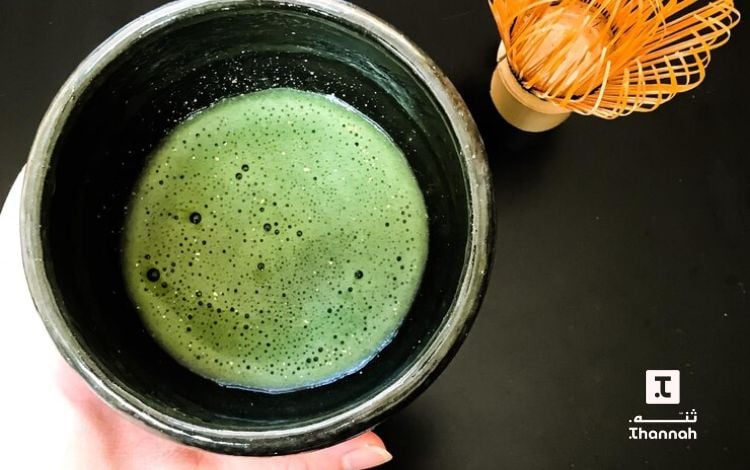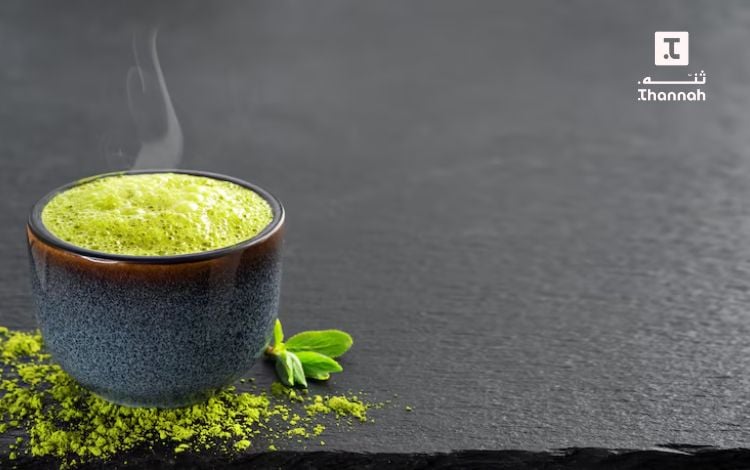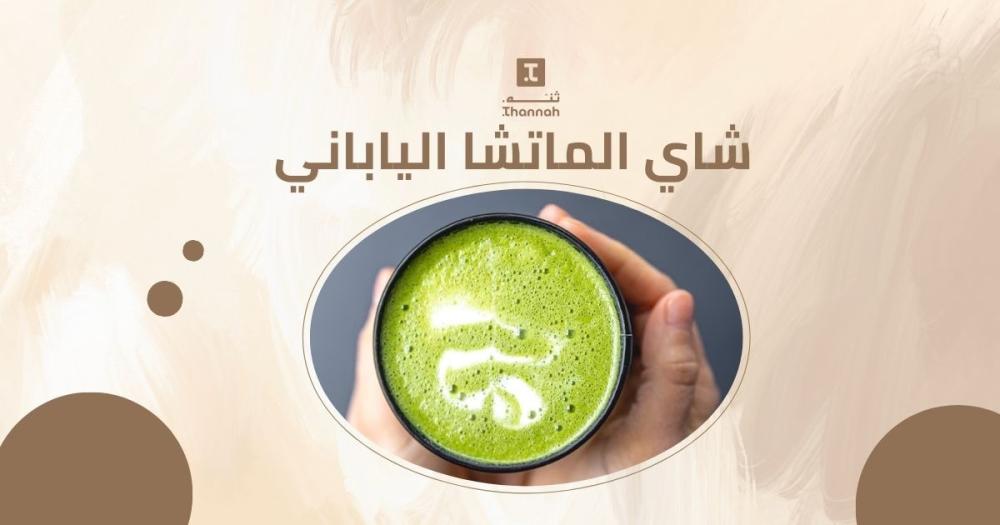In the quiet corners of tea rooms and on the tables of modern cafes, Japanese matcha tea appears with its distinctive green color. Deeply rooted in Japanese culture, its presence is no longer limited to ceremonies but has become a daily part of many people's lives.
Many people drink it for its taste and numerous benefits. With Thana, the best tea shop in Saudi Arabia, you'll learn exactly what matcha is and what its most prominent benefits and harms are. Read on.
What is Japanese matcha tea?
If you're not familiar with matcha, it's a Japanese green tea powder made from finely ground dried tea leaves. It has a slightly bitter, vegetal taste and a bright green color resulting from the high chlorophyll content in the leaves.
Regular green tea is promoted as an antioxidant, but matcha has even more benefits. Here's why:
When preparing other types of green tea, the leaves are steeped in hot water and then discarded. When preparing matcha, the powder is mixed with hot water or milk. As a result, you're actually consuming the entire tea leaf when you drink it! This may lower the antioxidants it contains, reduce your risk of heart disease, and boost your metabolic rate.
What about caffeine? Well, matcha contains more caffeine than regular green tea, but it doesn't give you the same high as coffee. It just makes you feel energized and focused, while still maintaining a calm state.
The origin of matcha tea
Matcha doesn't start with the cup, but with the shade of bamboo. In the tranquil fields of rural Japan, Camellia sinensis leaves are cultivated in a unique way that differs from other teas. About three weeks before harvest, the plants are covered with bamboo mats or light fabrics, in a farming practice known as trellising. This covering slows leaf growth and encourages the plant to produce more chlorophyll, giving matcha a deep, vibrant green color.
But color doesn't come alone. Along with it, the levels of amino acids increase, most notably theanine, which gives matcha a distinctive taste described as umami—a flavor that's neither too sharp nor too sweet, but rather has a pleasing balance in the mouth. When the harvest season arrives, the leaves are carefully hand-picked and then dried in a traditional way that preserves the flavor.

Traditional and modern matcha processing methods
Matcha leaf processing used to be done in a way that is now done in a faster and more modern way. The two methods are:
The traditional way
After the matcha leaves are picked, a meticulous journey begins to transform them into the green powder known for its purity and depth of flavor. The leaves are immediately steamed, a crucial step that stops the fermentation process and preserves their natural flavor and bright green color. They are then gently air-dried, the veins and stems removed, to produce a substance known as tencha. This pure form of the leaf is stored in cool places, where the days pass and its flavor is saturated.
The most precise step in this method is stone grinding. Here, a granite stone is used to grind the tencha slowly, without exposing it to excessive heat that might spoil its aroma or alter its nature. It can take an entire hour to produce a small amount of no more than 30 grams.
The modern way
In modern processing, ancient experience has been combined with modern tools. The basic steps remain in place, but more flexible methods have been added. Instead of mats alone, some farms use modern covers that are weather-resistant and easier to handle.
In the vast fields, precise machines are emerging to aid in picking and purification, while maintaining high quality standards. Even mills have evolved; some are now equipped with temperature control devices that speed up production without compromising on milling quality.
These changes have not deviated from tradition, but rather preserved its spirit, allowing matcha lovers around the world to savor a beverage that embodies the soothing scents of nature.
What does Japanese matcha tea taste like?
Matcha tea has a distinctly rich flavor. The tea leaf is dissolved whole in water, rather than steeped and then removed. This results in a smooth, creamy drink with a complex, herbal flavor that strikes the perfect balance between sweetness and nuttiness. Like all green teas, matcha also has a hint of bitterness.
Different types of matcha
Matcha can be divided into several types and grades, each with distinct characteristics and designed for different uses:
- Grade 1 : This is the finest matcha, and is intended for drinking only. As the name suggests, it is the type of matcha used in Japanese tea ceremonies. It has a smooth texture, a green color, and a delicate, sweet flavor.
- Premium : This type is sometimes classified as a culinary tea and is usually prepared from the second harvest of tea rather than the first. This gives it a stronger, more bitter flavor, while maintaining the same rich green color and nutritional benefits.
- Culinary Grade : Culinary grade matcha is used in baking and cooking, whether added to smoothies, ice cream, cakes, or lattes. The leaves used in its preparation are slightly older than other matcha leaves.
How to prepare Japanese matcha tea
Now that we've explained what matcha is and its types, let's take a look at how to enjoy the best cup of Japanese tea. It's easy to prepare matcha tea at home using a few simple tools and following these simple steps:
- Use hot water to heat a chawan tea pot or cup if you don't have one, then empty it.
- Sift 1 to 2 teaspoons of matcha powder into the bowl; this helps ensure there are no clumps of tea.
- Add a small amount of hot, but not boiling, water, as boiling water will burn the powder and make the tea taste not the best.
- Beat the mixture using a hand mixer. If you don't have a hand mixer, you can use a wire whisk or a spoon, but you won't get the same frothy texture.
- Start with a circular motion to dissolve the powder, then whisk vigorously with a zigzag motion to create a tea froth.
- Add more hot water to the tea, then whisk it again to get a foamy layer on top.
- Now enjoy a cup of matcha tea that will take you to calm and relaxation.
Health benefits of Japanese matcha
The health benefits of matcha tea are numerous and very similar to the benefits of the Northern Tea capsules offered by Thana Store. Among the most important benefits proven by studies are the following:
- Boosting attention and thinking: A small cup of matcha tea contains caffeine and one of the most important amino acids, theanine. In a 2017 study, it was noted that consuming 200 mg of theanine contributed to improving attention and mental abilities, especially when combined with caffeine. The effect here is not similar to coffee in its rush, but rather provides alertness accompanied by mental calm.
- Reducing the risk of cancer: Matcha also contains antioxidants, most notably a compound known as Epigallocatechin-3-Gallate, which has been linked in laboratory studies to reducing the growth of cancer cells. These results are not yet conclusive, but they open the way to a broader understanding of this type of tea's relationship to general health and prevention.
- Maintaining heart health: As for heart health, previous studies have shown that various types of green tea, including matcha, contribute to reducing harmful cholesterol levels in the body and lowering triglyceride levels, which are important factors for maintaining regular cardiovascular function.
Benefits of matcha tea for weight loss
On the journey to losing weight and achieving a better weight, some find matcha tea a companion. Matcha, with its active ingredients, may play a role in supporting the body during and after physical activity. Among the most prominent benefits of this matcha for weight loss are:
- Some studies have indicated that regular consumption of it may contribute to reducing fat levels, especially those concentrated under the skin, and have also observed a decrease in measurements such as body mass index and waist circumference.
- One of the most important points that distinguishes matcha is its potential impact on exercise performance. By supporting physical endurance and accelerating muscle recovery, the body can continue exercising for longer, and with greater effort, which in turn may increase the rate of energy expenditure.
- The presence of compounds such as catechins in Japanese matcha tea helps stimulate metabolism, especially in the periods following exercise, when the body remains in a fat-burning state.
- Matcha is also a great alternative to everyday drinks that are high in sugar or calories. A cup of it offers a rich taste without the extra calorie burden.
- Other aspects mentioned in this context include matcha's potential role in regulating blood sugar levels and reducing sharp fluctuations that affect appetite and mood. Additionally, its calming effect in reducing stress may reduce eating due to anxiety or distraction.
All of this does not mean relying entirely on matcha alone for weight loss, but it can be part of a balanced diet.
You can learn more about the best types of tea in Saudi Arabia.
Benefits of matcha tea for women
Matcha tea is a beverage that has become popular among women, due to its plant-based components that may contribute to supporting health in more than one way. Among its most important benefits for women are:
- Improves blood circulation: Matcha leaves contain antioxidants such as catechins, which are compounds that help stimulate blood flow. This improves the condition of the heart and muscles and enhances overall body activity.
- Strengthening the immune system: Matcha can play a role in strengthening the immune system, thanks to its important vitamins and nutrients, in addition to the presence of theanine, which is believed to stimulate the production of immune cells that help protect the body from daily causes of fatigue and inflammation.
- Skin care: Matcha offers a natural formula capable of supporting this aspect from within. Some personal experiences indicate an improvement in facial radiance and a reduction in some visible signs of stress on the skin, which may be linked to the antioxidant effect of this type of tea.
- Hair care: Hair also benefits from the vitamins and acids found in matcha tea, which strengthen the roots and help reduce breakage.
- Improved energy and athletic performance: The natural caffeine in matcha, along with theanine, helps boost energy and stimulate the mind without feeling overly agitated. This allows women to continue exercising while reducing feelings of fatigue.
You can get more benefits with the best Saudi tea offered to you by Thana Store. Visit the store and order it now.

Harmful effects of matcha tea
Despite the beneficial properties of matcha tea, consuming it in large quantities or indiscriminately may cause some side effects, especially in certain groups. Here are the most important points worth paying attention to:
- Excessive caffeine in the body: Matcha tea contains a significant amount of caffeine, and excessive consumption may lead to unwanted symptoms in some people, such as insomnia, difficulty sleeping, rapid heartbeat, headaches, and digestive disorders such as diarrhea. These symptoms may be more pronounced in pregnant and breastfeeding women, children, or those with caffeine sensitivity.
- Potential for lead contamination: Some matcha leaves may absorb heavy metals from the soil, such as lead, making consumption moderate, especially when consumed daily or in large quantities.
My experience with matcha tea
Don't you want to try Japanese matcha tea for yourself? I think it's time to try this unique Japanese tea, but it's recommended to buy it from a trusted source to ensure its authenticity and high-quality ingredients, as there are many fake and unreliable varieties available on the market.
If you're looking for an authentic tea with a distinctive flavor similar to matcha, all you have to do is order the finest tea from Thana Store, which offers the best Saudi tea capsules, including Jamr and Shamali tea. Get it now.
Frequently Asked Questions
What are the benefits of Japanese matcha tea?
Matcha tea contains antioxidants that support heart and immune health. It also helps boost concentration and physical activity thanks to caffeine and theanine. It is also used in diets that help control weight and improve skin tone.
What are the harms of matcha tea?
Consuming large amounts of matcha may cause symptoms such as insomnia, rapid heartbeat, and upset stomach due to the caffeine. Some types may contain traces of lead, so it is recommended not to overdo it. Pregnant women or those with specific health conditions should consult a doctor.

